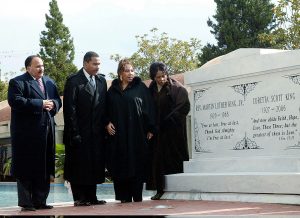Martin Luther King Jr.’s Children, Carrying on His Legacy

Photo: Martin Luther King III, Dexter King, the late Yolanda King, Bernice King taken in 2006, gathering together next to a new crypt dedicated to their parents in Atlanta.
On Thursday, April 4, 1968, Martin Luther King Jr. had returned to room 306 of the Lorraine Motel, thinking about a sanitation strike in Memphis and working on his sermon for Sunday. Its title: “Why America May Go to Hell.” Martin’s focus had shifted from civil rights to include more emphasis on antiwar agitation and populist economics, –and that, his family says, is why he was killed.
“The economic movement was why he was killed, frankly,” Martin Luther King III told NEWSWEEK. “That was frightening to the powers that be.” They allege there were political reasons, too. “RFK was considering him as a vice presidential candidate,” says Dexter, King’s third child. “It’s not widely known or discussed, [but] obviously those watching him knew of it. They [Kennedy and King] were both considered powerful and influential in terms of bringing together a multiracial coalition.”
Martin was taken away from his wife Coretta Scott King and four children, Martin Luther King III, Dexter Scott King, Yolanda King ( who died in 2007 ), and Bernice King. Their children have been carrying on his legacy and that of their mother, who died in 2006. They’ve each done so in their own ways, switching off as leaders of the Martin Luther King, Jr. Center for Nonviolent Social Change and speaking out on issues from gun control and voting rights to climate change and President Trump’s rhetoric.

Bernice King, a minister who has served as CEO of the King Center since 2012, set out to study her father’s work later in life, seeking guidance on the problems facing the country today. She is most drawn to sharing his beliefs on nonviolence — “one of the greatest aspects of his legacy.”
Her older brother, Martin Luther King III, a human rights and civil rights activist, focuses on what his father once called the “triple evils” of poverty, racism and militarism. “I think a culture of nonviolence will help create the condition where poverty is unacceptable, where racism is way behind us and not something that we have to deal with on a frequent basis, and where militarism and violence are reduced almost to be nonexistent,” he told TIME.
His 9-year-old daughter, Yolanda Renee King, the only grandchild of Martin Luther King Jr., spoke at the March for Our Lives last month to call for an end to gun violence. “My grandfather had a dream that his four little children will not be judged by the color of their skin, but by the content of their character,” she said to a crowd of hundreds of thousands. “I have a dream that enough is enough, and that this should be a gun-free world.” Martin Luther King III said she came up with the words herself, having heard her grandfather’s speech many times before.
That’s also the speech the King children consider when trying to stop what they see as the sanitizing of their father’s message. “We have been programmed as a society to focus on elements of the ‘I Have a Dream’ speech because it reduces him to just a dreamer… as opposed to a radical and a revolutionary,” Martin Luther King III says, referring to his father’s calls for a radical redistribution of wealth and a living wage — issues that he thinks are among the most important problems still facing society today.

A Black American expressing Martin’s affect on his life today:
It allows for me to see what determination, self-sacrifice and self-discipline will help you accomplish in life no matter what it is. As a black male there are many obstacles varying from truths to stereotypes that might hinder some. Yet, Martin Luther King’s example has helped to show me that the things set out to hinder you can be turned around and used to help you on life’ journey. Dr. King also gave an example of how a strong faith can help to guide you on the path of life.
— John Monroe, St. Petersburg, Fla.
A White American expressing Martin’s affect on his life today:
… one day in August of 1963 I caught part of a speech from our nation’s capital and even at 13, goose bumps rose on my flesh. It was here that I realized that the greatness in America exists in its people — people with the freedom and courage to fight a good fight. …
Martin Luther King Jr. taught me what America could be and I still have tears of thanks in my eyes when I reflect on that great American!
— Michael Leibow, Torrance Calif.
References:
http://time.com/5221075/martin-luther-king-jr-assassination-legacy-children/
http://www.washingtonpost.com/wp-srv/national/longterm/mlk/legacy/legacy.htm
http://www.nbcnews.com/id/34882891/ns/us_news-life/t/americans-reflect-mlks-legacy/#.WsVUctPwZsY


Leave a Reply